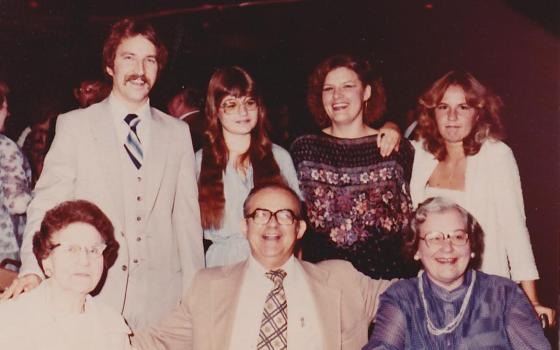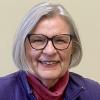I like the TV commercials about finding your ancestry. The person is always surprised by the results of the DNA sample. Instead of being 100 percent Italian, for example, she is Irish, Hungarian and Greek with a small percentage of Italian. I wanted to discover my ancestry, too. So I sent a saliva sample to the laboratory.
Not surprisingly, my foremothers and forefathers came from Poland, Germany and a smattering of folks from Great Britain. I was disappointed because I wanted to be as surprised about a connection to a different ethnicity and/or race as the people were on the commercials.
While at my mother's funeral repast, I told the relatives at the table about my discovery of some British heritage. As could be expected from my family, everyone started talking with bad English accents. My mother's cousin then stopped us short with the announcement that my great-grandmother was Jewish. Who knew?
It was apparent that most of us at the table did not know. I turned to Stella and asked how she found out about this. She answered, "My mother was not like your grandmother. She was a free spirit. My mom just told us that we were part Jewish. Your grandmother was prim and proper. She and your grandfather owned a grocery store. They just didn't want to jeopardize the business, I guess. That's what we all thought."
That rang true. My maternal grandmother was strict with us. No silly stuff. She had a well-kept, spotless home (dust would not have survived a minute in her house) and always dressed professionally. The few stories she shared were about how hard life had been for her. As the oldest of six, she was forced to quit school after 5th grade and go to work in a factory. She had wanted to be a sister, but that was not possible in her situation. Her marriage proved to be successful on many levels. She did say that she had a good life.
I felt hurt and confused that my mother did not share our Jewish roots with our immediate family. What I don't know is how this was handled by hermother. Based on my recollections of my grandmother, I would guess that my mother and her sister were told not to discuss it. They lived in Bridgeport, a neighborhood of Chicago populated with Polish, German, Irish and Lithuanian immigrants. It was overwhelmingly Catholic. People attended "their" churches and stayed within their own ethnic boundaries. Being different was not welcome. It isn't hard for me to believe that my grandmother did not want that information shared.
Yet there were hints of my mother's Jewish roots. I remember the smattering of Yiddish words my mother used, which were passed on to her children: schlep (lugging stuff), meshuga (chaotic, crazy), schlock (junk) and the like. And there was never a hint of anti-Semitism. In fact, on some Fridays when we had to abstain from meat, my mother would sometimes say, "What if the Jews are right?" followed by giggles from my brother and me and an exasperated sigh from my father. Now it all made sense.
The more I reflected on this, the more I felt bonded to Jewish traditions. I wanted to explore the prayer, the customs and the traditions. Not long after my discovery, I attended a shiva, the Jewish period of mourning after a death. I was struck by the beauty of the prayers, the ritual and, of course, the food.
The seven days of mourning had similarities to wakes and funerals I have attended. I saw the thread between the Jewish and Catholic traditions. It's all there in the traditions that I am familiar with: ritual, gathering of family and friends, storytelling, sharing food and some tears. In our diversity there is unity.
I was excited. I shared my curiosity about our Jewish roots with a good friend who commented, "We are all made of stardust. Everyone is related to everyone else. It's the cosmic connection; the cycle of creation." I knew that; but now it took on a powerful meaning. We are bonded in our diversity because it is a universal truth.
The new knowledge of my heritage gave me more than just another ethnicity; it gave me an insight into the gift of diversity. The more knowledge we have about ourselves, the more light is shed on the lives of others. It brings a new understanding of compassion because we begin to get a glimpse of how another might choose paths we would not.
I can look to my own family and realize that motivations are often not clearly understood especially from a generation or two later. While I reveled in knowing I had yet another dimension in my story, I also learned of the fear and pain my mother and grandmother might have experienced. Rather than embracing their roots, they hid them. Perhaps we can only hold each other in prayer and awe when we try to comprehend the other's actions.
In our Chapter of 2006, the Sisters of Providence offered a tool, the Providence lens, for helping us to discern our authentic relationship with God, self, others and all creation. One of the aspects of the Providence lens that stayed with me is that Providence calls us "to perceive wholeness in brokenness and design in chaos."
The importance of finding my heritage compelled me to appreciate both the diversity and the universality of our relationship to allpeople and, by association, allCreation. It also led me to face the brokenness in my family. I found myself appreciating the struggle my mother and grandmother had with their respective identities. How did that shape their lives? How did that impact their judgments? In light of this discovery, I ask how I accept myself. Who do I say I am?
The struggle to align ourselves with the Divine demands that we humbly acknowledge all that we are in order to create a space where we are able to actualize our best selves. When I know who I am and that I desire transformation, I am open to the movement of the Spirit.
I recently heard someone say that we all have a personal, a private and a public self. I don't need to tell everyone everything about myself; but I need to know it and own it. Having been given the gift of one more piece of my life's puzzle will affect who and how I am from this point forward. It gives me new insights. It gives me a deeper sense of compassion. It gives me the ability to create with more authenticity. It brings me closer to the cosmic union of the Divine.
I discovered much more than my ethnic ancestry when I submitted a saliva sample. I discovered a richer understanding of my mother and a growing compassion for people with hidden shadows yearning to embrace their story and stand in the light.
Shalom!
[Sue Paweski has been a Sister of Providence of St. Mary of the Woods for 20 years. Currently, she is leaving her position as a fine arts teacher in elementary education to assume the position of co-director of her community's associate program.]

